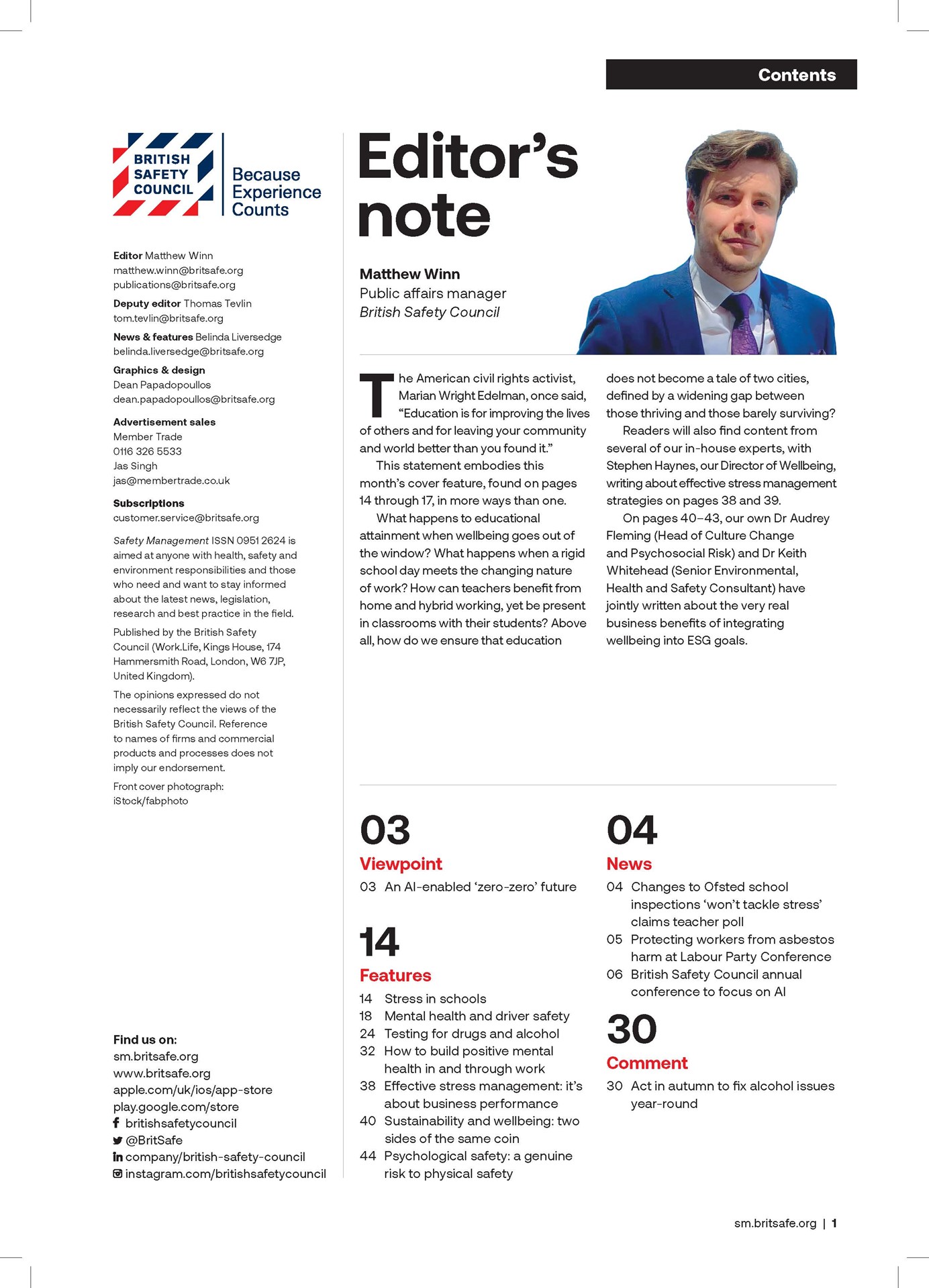The pandemic has accelerated the demand for change and created opportunities to make work better. We have seen rising levels of mental ill health, a trend that is likely to be long lasting, particularly among younger and more disadvantaged employee groups.
Opinion
Mental and physical health: it's time to achieve parity
Encouragingly, we have also seen progress in the way mental health has been prioritised across society, with more organisations than ever committed to protecting and promoting both the physical, and increasingly, the mental health of their employees.
For the past four years, Business in the Community (BITC) has commissioned YouGov to conduct a national mental health at work survey. Year-on-year, we have seen an increase in the proportion of UK employees who have experienced poor mental health, caused, or worsened by work – up from 39 per cent in 2019 to 41 per cent in 2020. The leading causes are excessive pressure, workload, long hours and lack of annual leave.
 Louise Ashton: "There should be no dichotomy between managing physical and mental health and safety."
Louise Ashton: "There should be no dichotomy between managing physical and mental health and safety."
Can you imagine how entirely unacceptable it would be if nearly half your employees had experienced a physical work-related injury? So why should we tolerate employees having their mental health negatively impacted by work? There should be no dichotomy between managing physical and mental health and safety. Risks and hazards to mental health should be managed and mitigated against in the same way as physical health.
Psychological safety has no widely recognised generic definition and means different things to different stakeholders. We need to create cultures where employees feel safe to be able to speak up and be listened to without fear of reprisal for disclosing a mental health issue or making a mistake; a culture where employees have a voice and a place at the table and can perform at their best.
Being open at work about mental health issues can be difficult and can unfortunately lead to negative consequences. Sadly, it doesn’t always pay to speak up about experiencing a mental health issue. Twelve per cent of employees who did disclose, were subsequently sacked, forced out, demoted against their wishes, passed over for a promotion or subject to disciplinary proceedings. Unsurprisingly, 30 per cent of employees don’t tell anyone if they are experiencing poor mental health, due to fear of negative consequences.
Good job design is crucial in enhancing mental health and wellbeing
Although work can be part of the cause of poor mental health, good work must be part of the solution. For far too long, organisations have focused on reactive measures to attempt to tackle poor mental health, focusing on the tactical, low hanging fruits, such as awareness training, employee assistance programmes (EAPs) and yoga. However, a large body of research indicates that levels of mental health and wellbeing at work are influenced by more fundamental aspects of job design.
Business in the Community’s report, What if your job was good for you?, tackles the systemic causes of poor work design and organisational culture to enable sustainable positive mental health and wellbeing. Central to the report is our ‘Better Work Framework’, designed for all organisations regardless of size or sector. It provides evidence-based suggestions as to how employers can achieve cultures that support ‘good’ jobs and ‘better’ work for all.
The framework brings together five enablers, that support ways of working that drive long-term wellbeing, and four organisational values, that sit underneath and operationalise ‘better’ work, underscored by sustainability. The framework recognises that to achieve and maintain ‘good’ jobs, wellbeing needs to be integrated into everything that you do as a business.
The framework complements the new international ISO 45003 guidelines for managing psychosocial risks by focusing on creating cultures that achieve parity between the management of physical and mental health and safety, with an open and accountable culture.
Jobs that support good mental health boost staff retention and recruitment
As we transition out of the pandemic, there is the opportunity to embrace change and strive to create better jobs for everyone. Doing so will result not only in increased productivity, retention, resilience and wellbeing of our employees, but also across organisations and in our wider society. Attracting and retaining top talent is now more competitive than ever before. Jobseekers are more aspirational and now have more choice and greater visibility on what it’s really like to work for employers through platforms such as Glassdoor and Indeed.
The pandemic has provided the opportunity for people to take stock as to what is important to them, and more employees are choosing to work for organisations that prioritise mental health and wellbeing.
Louise Aston is Wellbeing campaign director at Business in the Community (BITC), The Prince’s Responsible Business Network
OPINION

Work-related road risk – steering clear of danger
By Ben Pepper, CL Medilaw on 30 October 2025
Each day across the UK, millions of employees take to the roads as part of their working lives. Whether delivering parcels, attending client meetings or riding bicycles between jobs, road use plays a vital role in keeping businesses going. While the general health and safety landscape has evolved significantly over recent decades, work-related road risk (‘WRRR’) remains an area that is too often overlooked by employers.

It is time to end the lottery of asbestos compensation
By Daniel Easton, Association of Personal Injury Lawyers on 30 October 2025
A legal anomaly that makes it more difficult for sufferers of asbestos-related lung cancer to obtain compensation than people who have developed mesothelioma means large numbers of people are dying before receiving full compensation that could prove vital in the final months of their lives.

An AI-enabled ‘zero-zero’ future
By Mike Robinson FCA, British Safety Council on 07 October 2025
In a relatively short time, Artificial Intelligence (AI) has become synonymous with technological development, but development doesn’t inherently mean that the workers of the world will have a safer future.



